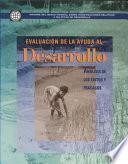Assessing Aid
Autores del Libro:
Resumen del Libro:

In different times and places, foreign aid has been highly effective, totally ineffective, and everything in between. It assisted growth in the Republic of Korea and Botswana in the 1960s, Bolivia and Ghana in the late 1980s, and Uganda and Vietnam in the 1990s. It still plays a critical role in supporting institutional and policy reform in developing countries, which is crucial for alleviating poverty. However, foreign aid has also failed spectacularly. Incompetence, corruption, and misguided policies persisted for many years in the former Zaire, for example, where there was a steady flow of aid. And in Tanzania, despite $2 billion in aid over twenty years, lack of provision for maintaining roads meant the roads often deteriorated faster than they could be built.Assessing Aid includes important research such as: * analyzing aids nonfinancial role–its impact as a transfer of technology or ideas, * investigating how foreign aid is declining sharply at a time when reforms in developing countries have made it most effective, * examining whether foreign aid is fungible, * documenting that effective assistance demands that donors be selective, innovative, coordinated, and self-critical, * examining the overall effect of assistance on the countries per capita income growth. Foreign aid has proved to be effective in increasing the rate of growth, reducing the poverty level, and lowering infant mortality rates in many countries. Yet more than 1 billion people still live in extreme poverty on less than $1 per day. Properly managed foreign aid can make a big contribution to improving the lives of millions. Assessing Aid sets the pace for improving the effectiveness of foreign aid in promoting growth and reducing poverty worldwide.
Formatos Disponibles: PDF / EPUB
Opciones de descarga:
Si deseas obtener una copia del libro puedes usar alguna de las siguientes opciones de descarga: